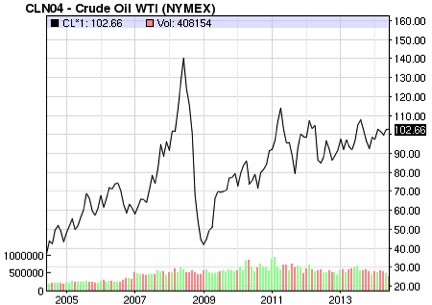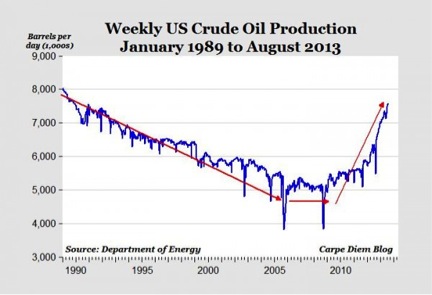Alternative investments—those outside of the stock and bond market—have proliferated since the decline in 2008. As a result, oil/gas has become one of the biggest beneficiaries, second only to REITS.
With this growth and proliferation of oil, I thought it would be beneficial to review why investors are price-takers, despite our belief—or hope—otherwise.
Recent Price Trends
As prices have risen, with a 100% increase in 2007 and 2008, oil prices have settled at lower rates than before due to the developments of oil in the United States.
The price spike in 2007 and 2008 was established by shocks that proliferated through the system.
James L. Smith, the Cary M. Maguire chair in oil and gas management at the Edwin L. Cox School of Business at Southern Methodist University, believes that the price spike was caused by a succession of shocks:
In February of 2008, Venezuela cut off oil sales to Exxon Mobil Corporation (NYSE:XOM) during a legal battle over nationalization of the company’s properties there. Production from Iraqi oil fields, of course, had still not recovered from wartime damage, and in late March saboteurs blew up the two main oil export pipelines in the south—cutting about 300,000 barrels per day from Iraqi exports. On April 25, Nigerian union workers went out on strike, causing ExxonMobil to shut in production of 780,000 barrels per day from three fields. Two days later, on April 27, Scottish oil workers walked off the job, leading to closure of the North Forties pipeline that carries about half of the United Kingdom’s North Sea oil production. As of May 1, about 1.36 million barrels per day of Nigerian production was shut in due to a combination of militant attacks on oil facilities, sabotage, and labor strife. At the same time, it was reported that Mexican oil exports (tenth largest in the world) had fallen sharply in April due to rapid decline in the country’s massive Cantarell oil field. On June 19, militant attacks in Nigeria caused Shell to shut in an additional 225,000 barrels per day. On June 20, just days before the price of oil reached its historic peak, Nigerian protesters blew up a pipeline that forced Chevron Corporation (NYSE:CVX) to shut in 125,000 barrels per day. Each of these events clearly registered in the spot market. It is not implausible to believe that, arriving in quick succession, they contributed heavily to the rapid acceleration in the spot price of oil.

The subsequent decline in prices was a result of the economic contraction in the second half of 2008 combined with the realization that the shocks were only temporary.
Investor-Owned Oil Companies
Today, just 8% of the world’s oil supply lies with oil reserves owned by public investor-owned companies. The rest is owned by state-owned oil companies and the Organization of the Petroleum Exporting Countries (OPEC) that is active in Saudi Arabia, Russia, Brazil, Mexico and Norway to name a few.
OPEC itself controls nearly 75% of the world’s oil reserves. However, in terms of the supply, it provides only 33% of output. Consequently, OPEC has a resounding control over prices.
In the short term, little can be done to change the supply dynamics of oil. Most individual and commercial transportation runs on oil. The speed with which this is changing, despite hybrid cars and the introduction of electric cars like Tesla Motors Inc (NASDAQ:TSLA), are not growing fast enough to change demand.
Oil fracking, predominantly in North Dakota, has led to a surge in production. For the first time since the early 1970s, the U.S. production of oil accounts for 10% of the supply.
This development certainly enables U.S. investors to transition from being price takers to price enablers.

As the graph above shows, production has increased 50% over the course of four years and there are no signs that this will slow down. As a result, there is a chance that the U.S. will be less reliant on foreign oil than it is today.
Why OPEC Still Matters
Before we get ahead of ourselves, we need to remember why OPEC still matters. New cars, especially in emerging markets, are driving off dealership lots every day. This ever-increasing demand for oil puts OPEC right in the center of an energy-consuming economy.
A great deal of consistent production stems from Saudi Arabia and the other OPEC members wanting to ensure their predominance and leave a legacy for the children and grandchildren. Almost all of the economic development in Saudi Arabia is from oil. As a result, oil prices drive the revenue generation of the whole economy. Since the government owns the oil, the industry is responsible for most of the salaries for kings, prime ministers and officials in all departments.
This reliance on oil causes the price of breakeven oil to increase and supports why Saudi Arabia has limited the production total to 30 million barrels a day over the last 40 years. They want to keep prices higher than what it costs to operate the government.
Today, the breakeven oil price for Saudi Arabia is believed to be about $90 a barrel, compared to $108 from Brent Crude today. However, Saudi Arabia’s breakeven prices are expected to increase to $118 by 2020 and $321 by 2030 (Source: Jadwa Investments and Anne Korin, Co-Director Institute for the Analysis of Global Security).
Price and Imports
Since the 1970s, when the 1973 and 1979 oil embargos occurred, political focus has been on reducing the importation of oil from abroad. The truth is that the U.S. has never imported more than 15% of its oil from the Persian Gulf. Currently, this number has fallen to 9%.
Overall, oil imports to the U.S. have declined to 36% of demand from 60%.
But reducing the importation of oil is not the entire story. Despite reducing oil imports, prices on average are higher today than they were 5, 10 and 20 years ago. In just nine years, the amount spent on gasoline, oil and petroleum products in general has drastically increased.
Due to OPEC’s control of reserves and total supply, the organization continues to have a significant impact on the price of oil. Therefore, investors in oil should realize that an increase in the production of oil is beneficial and in no way helps control the price of oil or removes the U.S from feeling oil price shocks. Additionally, investors should continue to monitor the impact that OPEC has on oil prices.
